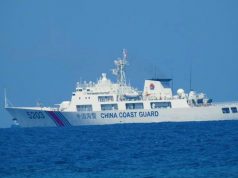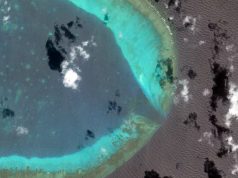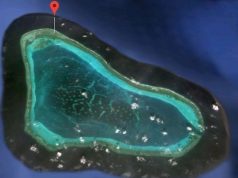MANILA – Tapping oil and gas reserves in the Reed Bank – a resource-rich area within the Philippines’ exclusive economic zone – could be a key growth driver as the country looks to expand both public and private investments in the next five years, according to businessman Manuel V. Pangilinan.
Pangilinan heads PXP Energy Corp. (formerly Philex Petroleum) which through the London-listed Forum Energy Plc was awarded Service Contract 72 in the Reed Bank, but was stopped by the Aquino administration in 2015 from proceeding with further tests pending the outcome of Manila’s case against China before a UN arbitral court in The Hague.
This time around, however, the Philippines should start moving fast to find alternative sources of energy once the Malampaya gas field off Palawan runs out, Pangilinan told the BusinessWorld Economic Forum on May 19. Failing that, business activities could suffer serious damage from crippling power outages, he added.
He spoke about fast-tracking work at Reed Bank just hours before President Duterte made a headline-hogging revelation: that in his latest exchange with Chinese President Xi Jinping, the latter had replied to his remark about Manila’s drilling for oil and gas in the West Philippine Sea by making a supposed threat there will be “war.”
Pangilinan’s speech dwelt mostly on the key growth drivers, and he reviewed the three areas of government: “first, the government’s tax reform for acceleration and inclusion; second, infrastructure; and third, investment in businesses which could propel growth.”
Pangilinan added, “There could be a fourth game changer – gas in the South China Sea.”
With Malampaya expected to start depleting in 2024, Pangilinan said. “It is imperative that we start looking for alternative sources of gas now – failing which, gas has to be imported. We simply cannot leave the 3 gas plants of 3,000 mw in Batangas stranded – brownouts will ensue, for certain.”
The first critical step, he added, “is to determine if there are indeed commercial gas resources in the area,” referring to the areas where previous tests were made, with some estimates putting the volume at equal to or bigger than the one in Malampaya.
“In 2012, Philex Petroleum disclosed the highlights of an interpretation report of new 3d and 2d results, together with the vintage data acquired earlier, over Service Contract 72. A best estimate of contingent resources in the North Bank was reported – equivalent to about 2.6 trillion cubic feet of gas – about the size of Malampaya – plus oil and condensate gas of 65 million barrels,” Pangilinan reported.
In late 2016, Pangilinan had rued the long period of inactivity in the Reed Bank, and reminded people that preparing the gas field would take at least 10 years, so it was important to start moving before Malampaya runs out completely.
Speaking on Friday at the BWorld forum, he said that while there is “no assurance at this time that these estimates are accurate until further drilling and technical evaluations are made,” the consortium is “encouraged that the Duterte government has provided an accomodating environment with its open, constructive approach to China.”
He noted that a bilateral consultation mechanism has recently been formed to agree on a code of conduct in the region.
Duterte’s shock revelation
Ironically, just hours after Pangilinan spoke, Duterte revealed that from his latest exchange with Chinese President Xi g, the latter had pointedly warned of “war” if Manila insists on drilling in areas in the West Philippine Sea that Beijing insists until now are its territory, notwithstanding the July 2016 ruling of the UN arbitral tribunal.
According to a Reuters report, Duterte had made the revelation to prove his critics wrong when they said he has gone soft on Beijing by refusing to push it to comply with the arbitral award in 2016.
To prove he had not gone soft on the matter, Duterte said late Friday he discussed it with Xi when the two met in Beijing on Monday, and got a firm, but friendly warning, Reuters reported.
“We intend to drill oil there, if it’s yours, well, that’s your view, but my view is, I can drill the oil, if there is some inside the bowels of the earth, because it is ours,” Duterte said in a speech, recalling his conversation with Xi.
“His [Xi’s] response to me, ‘we’re friends, we don’t want to quarrel with you, we want to maintain the presence of warm relationship, but if you force the issue, we’ll go to war.”
Duterte has long expressed his admiration for Xi and said he would raise the arbitration ruling with him eventually, but needed first to strengthen relations between the two countries, which the Philippines is hoping will yield billions of dollars in Chinese loans and infrastructure investments.
The Hague award clarifies Philippine sovereign rights in its 200-mile Exclusive Economic Zone to access offshore oil and gas fields, including the Reed Bank, 85 nautical miles off its coast.
It also invalidated China’s nine-dash line claim on its maps denoting sovereignty over most of the South China Sea.
Until Sunday, Beijing had not issued any statement clarifying or confirming Duterte’s account of his exchange with Xi.
His remarks came the same day that China and the Philippines held their first session in a two-way consultation process on the South China Sea.
They exchanged views on “the importance of appropriately handling concerns, incidents and disputes involving the South China Sea”, the Chinese Foreign Ministry said in a statement that gave few details. With an earlier report from Reuters










